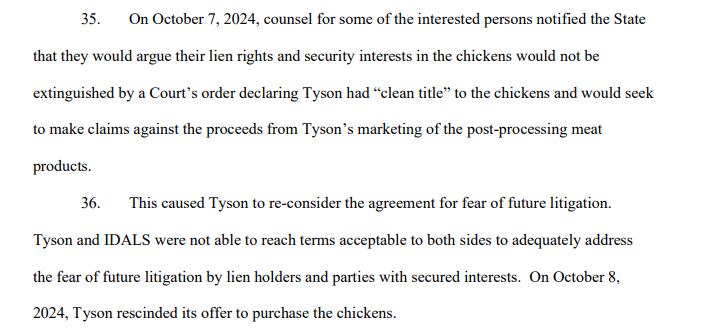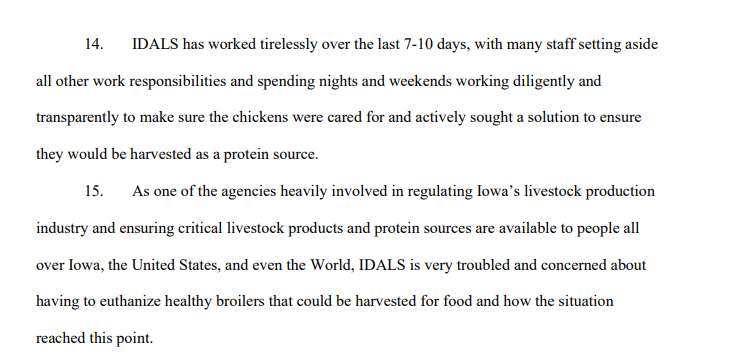1.3 million chickens euthanized in Iowa, Congress questions USDA
(ABC 6 News) — Sioux County court documents provide some insight into how and why the 1.3 million broiler birds were euthanized last week, instead of being processed or sold.
The Iowa Department of Agriculture and Land Stewardship (IDAL) said in an update Oct. 25 that they had pursued buyers, and even questioned whether the chickens’ meat could be processed and donated to Iowans facing food insecurity.
However, as IDAL negotiated with buyers, Pure Prairie Poultry’s creditors weighed in on potential sales and said they would assert their rights to the chickens, possibly taking a cut from a buyer’s proceeds. This caused at least one buyer to back away from a deal, according to court records.
“After exhaustive efforts, no credible offers or proposals materialized,” according to the IDAL. “Given the unavailability of buyers and lack of processing capacity combined with the ever-increasing feed and yardage costs, as well as the taxing of Department staff resources managing broilers with no end-market, the Court granted the Department authorization to begin depopulation.”
The birds were euthanized between Oct. 17 and 25.
“Though the Department believes depopulation should always be a last resort, it provides finality to this unfortunate circumstance, limits the ever-increasing costs to the taxpayers of Iowa and prevents any potential animal welfare issues,” according to the IDAL statement.
The road to euthanasia
According to Sioux County court records, the IDAL first negotiated with Tyson Foods Oct. 4 to sell the chickens for $0.50 per bird once they reached an ideal weight.
“The State indicated that while this proposed disposition may not result in
much proceeds beyond covering IDALS’ costs, if it is even able to cover IDALS’ costs, it was
the best, and only, formal proposal IDALS had received to address a global disposition for the chickens,” court documents read.

The Sioux County court records do not state which creditors specifically indicated they would pursue proceeds from Tyson’s processing and sale of the birds.
However, several creditors appeared in the Sioux County court hearings: Rock Hill Genetics, First Cooperative Association (AgState), Premier Cooperative, and Hull Cooperative Association.
AgState is a secured creditor, which Pure Prairie Poultry (PPP) owed $356,214.64 in mid-September, according to the plant’s bankruptcy filing.
Premier is also a secured creditor, owed $1,595,899.67 in late September, according to the bankruptcy filing.
Hull Cooperative Association was not listed in PPP’s September bankruptcy documents, but Rock Hill Genetics had an unsecured claim to $416,093.51.
In Oct. 8 court proceedings, the IDAL stated that Pilgrim’s Pride, a MN processer, was interested in accepting some of the 400,000 or so Pure Prairie chickens in Minnesota for slaughter and processing — but “has now backed out due to inability to get sign-off from all the parties with an interest in the chickens.”
Court records referenced KAAL’s reporting on chickens starving and resorting to cannibalism in Wisconsin, another state without governmental aid in feeding the livestock.
RELATED: Growers for Pure Prairie Poultry say their chickens are starving – ABC 6 News – kaaltv.com
On Oct. 10, Sioux County court records indicate that IDAL came up with a second sale offer — $0.50 per chicken from Pitman Farms.
That sale fell through because of “multiple contingencies,” and Stanger’s clients requested until Oct. 17 to try to find a new buyer for the birds.
No buyer materialized.
“This is a tragedy for so many involved,” Kristina Stanger, representing the AgState, Premier Cooperative, and Hull Cooperative, said in an email. “… There certainly is more to the story than what is contained in the State of Iowa’s court filings. I would invite folks to review the transcripts from the Court Hearing on October 8th and 11th for the Coops’ position in the case. Unfortunately, with Pure Prairie continuing to be in court proceedings with its creditors, including our clients, we are not in a position to provide more details at this time.”
ABC 6 News has requested hearing transcripts from Sioux County Court, but did not receive them Oct. 29.
Attorney Alexander Johnson, representing Rock Hill Genetics, said the business would not comment on the matter.
The IDAL expressed concern about the lack of a sale in Sioux County court records.

Congress questions USDA
After the birds were euthanized, several members of congress including Rep. Brad Finstad (R – Minnesota), Senator Chuck Grassley (R- Iowa), Senator Joni Ernst (R – Iowa), and more sent a letter to the United States Department of Agriculture demanding answers about oversight of the poultry plant.
In 2022, $45.6 million in grants and loans was given the Charles City Plant, and just two years later, the plant has closed its doors.
“Ultimately this facility has no business being in operation if the government has to hand tens of millions of dollars to it to operate for a couple years, then failing and leaving animals to die,” Colin Henstock, associate director of project strategy for PETA, said.
Members of congress are now calling on the USDA for answers to what they knew about the plant’s financial situation and when.
“It’s important for the USDA to support the farm economy, especially in today’s tough market, but companies don’t just fail out of the blue,” Senator Grassley said.
Rep. Finstad said if the USDA knew the situation at Pure Prairie, it should have stepped in.
“If they truly did know with some runway or advanced warnings, they sure as heck could have done a better job of engaging local, state and federal partners to try to figure out a way to make sure those birds were able to make it to market,” Finstad said.
In a statement to ABC 6, the USDA said it was trying to to help get the facility reopened, and encouraged congress to do the same.
“Over the course of this Administration, USDA has been working furiously to rebuild and create new markets for farmers, after many important ones were decimated by trade wars and the COVID-19 pandemic. To this point, millions of dollars of investments in these lawmakers’ states are providing critically important new options for farmers, strengthening local and regional food supply chains, expanding independent processing capacity, lowering input costs, and more, actions which many of these signers have championed. At the same time, given its importance as a processing option for Iowa, Minnesota, and Wisconsin farmers, USDA is working to help the facility reopen. Rather than trying to score political points, those members of Congress should work with USDA to reopen the facility and pass a new Farm Bill, which is now two years late,” a spokesperson for the USDA said.